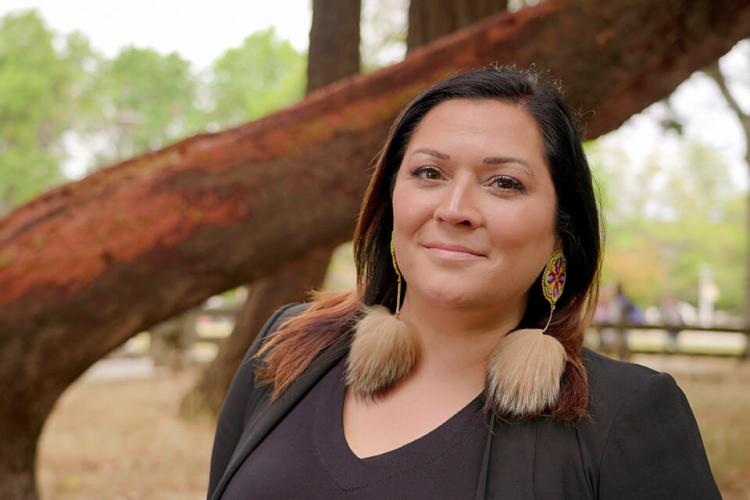
Dr. Heather Igloliorte joins the University of Victoria as the inaugural Canada Excellence Research Chair in Decolonial and Transformational Indigenous Art Practices. Credit: UVic Photo Services
Globally renowned Indigenous art historian and curator Dr. Heather Igloliorte joins the University of Victoria as the inaugural Canada Excellence Research Chair in Decolonial and Transformational Indigenous Art Practices.
The $8-million research chair, which is funded through the Canada Excellence Research Chairs program and administered by the Social Sciences and Humanities Research Council on behalf of Canada's federal granting agencies, was announced on Thursday. It will advance reconciliation through the transformative power of art and innovative exhibition practices and support a new generation of students, researchers, educators, curators and artists to drive change through artistic practice.
The Honourable Terry Beech, Minister of Citizens' Services, on behalf of the Honourable François-Philippe Champagne, Minister of Innovation, Science and Industry, announced support for 34 new research chairs, including the appointment of Igloliorte at a Metro Vancouver ceremony attended by Igloliorte, UVic administrators and scholars from across Canada.
Igloliorte's research in decolonial and resurgent Indigenous creative practices in Canada will focus on institutional, community-based and collaborative research towards decolonization across the country and internationally.
"The arts have the power to challenge the historical narrative of Canada's colonial truth' as told and hidden by museums, galleries, educational institutions and public spaces. With art, we can create meaningful shifts in relationships between Indigenous and non-Indigenous peoples and support systemic and structural cultural, social and economic change towards decolonization."
- Dr. Heather Igloliorte, inaugural Canada Excellence Research Chair in Decolonial and Transformational Indigenous Art Practices
Igloliorte will provide training and mentorship to Indigenous and other equity-deserving post-secondary students especially those from remote, northern, reserve and other underserved communities. Through hands-on learning and opportunities to experiment and innovate, these emerging researchers and professionals will be equipped to transform the future.
"This new chair represents progress in so many ways. It recognizes the pivotal role arts-based research can play in creating a more just society and shines a spotlight on the impact of Indigenous-led scholarship. We're beyond excited to welcome Heather to UVic and we know her contribution to our students and extended arts community will be profound."
- Lisa Kalynchuk, UVic vice-president, research and innovation
Applying her skills in digital media, artistic processes and boundary-pushing curatorial methods, Igloliorte will bring together Indigenous knowledge and artistic practices from the past, present and future. In the process, she will move institutional, community-based research and museum practices towards decolonization.
"Alongside many partners who have committed to share in the work of this CERC, our goal is to leverage the transformative power of art and creative intervention for the benefit of Indigenous futurity especially through the work of artists and communities," Igloliorte says, reflecting Indigenous Futurisms, the scholarly and artistic movement that imagines alternative futures for Indigenous Peoples.

Installation view of INUA:Inuit Nunangat Ungammuaktut Atautikkut (2021-2023) in the main Inuit gallery at Qaumajuq, courtesy of Winnepeg Art Gallery. Photo: Lindsay Reid
"I look forward to uniting and empowering an international network of artists, curators, scholars and community members to advance new decolonial and Indigenous scholarship and practices through research and experimentation in art-making, exhibitions, policy and public engagement. We believe it's time for innovative work to revolutionize museum and gallery practices for the 21st century."
The CERC program, jointly administered by the Canadian Institutes of Health Research (CIHR), Natural Sciences and Engineering Research Council (NSERC), and Social Sciences and Humanities Research Council (SSHRC), supports world-renowned researchers and their teams to establish ambitious research programs at Canadian universities.
Igloliorte's multifaceted and interdisciplinary work aligns with UVic's commitment to ʔetal nəwəl | ÁTOL,NEUEL | Respecting the rights of one another and being in right relationship with all things, as well as its commitment to the United Nations Sustainable Development Goals focused on quality education, decent work and economic growth, reduced inequalities, peace and justice.
Read more in the campus article: Transformational reconciliation through exhibitions.
Read the Government of Canada release.
About the University of Victoria
UVic is one of Canada's leading research-intensive universities, offering life-changing, hands-on learning experiences to more than 22,000 students on the spectacular BC coast. As a hub of transformational research, UVic faculty, staff and students make a critical difference on issues that matter to people, places and the planet. UVic consistently publishes a higher proportion of research based on international collaborations than any other university in North America, and our community and organizational partnerships play a key role in generating vital impact, from scientific and business breakthroughs to achievements in culture and creativity. Find out more at uvic.ca. Territory acknowledgement













